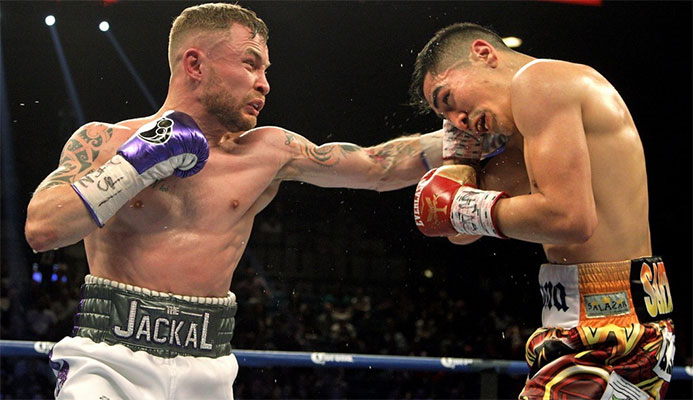Magnanimity is not a word much extracted from the sporting lexicon these days.
Indeed, it has become virtually extinct in almost every walk of life where ruthlessness, churlishness, dissent and cynical one-upmanship by almost any means have superseded it in sport, politics, business - you name it.
So I applaud a couple of uplifting events at the weekend which did the old ticker good, reminding us that another almost obsolete word, sportsmanship, can still prevail.
In Las Vegas, Ulsterman Carl "The Jackal" Frampton, arguably Britain’s superior boxer, surrendered his prized world featherweight belt and unbeaten record to his friendly foe Leo Santa Cruz, the Mexican with whom he struck up a comradeship after taking the same title from him in New York last summer.
It was a bruising, 12 rounds points defeat by majority decision, one of the three American judges calling it a draw, the other two giving it by a couple of rounds to Santa Cruz. Personally I made the Mexican win by a wider margin.
It was a good, hard fight, though not quite of the calibre as their original meeting. And most of the rounds were very close.
In similar circumstances many fighters would have thrown a wobbly, screamed blue murder about being robbed and stomped off in a paddy.
But Frampton, protégé of Barry McGuigan, who himself had forfeited the same title in Las Vegas in 1986, chose not to squawk in protest. Instead he elected for honesty and humility, such a rarity in boxing - and a host of other sports these days.
Arms wrapped around his Mexican mate he declared unequivocally that the better man had won. There were no complaints from him or the 5,000 Irishmen who had followed him to Vegas as they filtered quietly into the Nevada night.
Frampton’s first tweets after what must have been a devastating loss showed him to be a truly class act and were a lesson in magnanimity. "Santa Cruz was clever and he used his reach well…I think he deserved to win. Being honest, the better man won on the night. He double bluffed me."
After such a setback many deposed champions would have hidden away from the spotlight, but Frampton invited all his fans to the Nine Fine Irishmen pub after the fight and paid for drinks all round.
He even later tweeted the man who out-fought him on the night: "A great fighter & even better man. We have to do it again. Congratulations champ."
He promised fans he would regain his lost title. "I just want to thank everyone for coming out, I know it cost a lot of dough to get here," said Frampton from the balcony.
"Sorry to disappoint you."
The fight was good enough to deserve a trilogy and obviously Frampton would like the decider to be to be in Belfast, even inviting his opponent to be a guest at his house while he spent his own time at a training camp.
Frampton is a little man but he has emerged a bigger one for his defeat, and the manner in which he accepted it.
Similar magnanimity was also in evidence a few hours later and some 9,000 miles away, but this time from a winner.
In an epic Australian Open final in Melbourne, Roger Federer collected his 18th Grand Slam tennis title at 35, defeating Rafael Nadal in a sensational five setter.
And afterward he made a point of paying a generous tribute to his younger opponent, saying it would have been nice if both of them could have won - and jokingly even offering to share the trophy.
"There are no draws in tennis," said Switzerland's biggest cheese. "It is brutal, but I would have been happy to share a draw with him.
"Rafa has made me a better player...he remains for me my ultimate challenge to play against. He is definitely very special."
What also is very special are occasions when such sporting values are seen or expressed.
For sport is at its most sublime when it is played fairly and where respect is shown to the opposition. But sadly, this happens all too infrequently.

